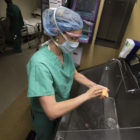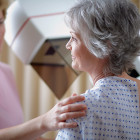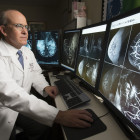Cancer Death Rates Decline, But Income Is A Factor In Survival
|
Advances in early detection and cancer treatments have resulted in a 27 percent decline in cancer deaths in the U.S. in the last 25 years, but those benefits are slow to trickle down to those who are lower on the socioeconomic scale, according to a report by the American Cancer Society. In the nation’s poorest counties, the cancer mortality rate is 20 percent higher than in the most affluent counties, and “the difference is much larger for cancers that are the most preventable: cervical, colorectal and lung,” said Rebecca Siegel, strategic director of Surveillance Information Services at the American Cancer Society and an author of the study. Robert Ciemniewski, 57, a longtime smoker from Connecticut, was on the wrong side of the statistical divide when he walked into the emergency room in 2017 with breathing difficulties from what he thought was pneumonia. He did have pneumonia, but he also had advanced lung cancer. Ciemniewski had not had a health checkup since 2013, when he quit his job as a mailman to care for his ailing mother.





